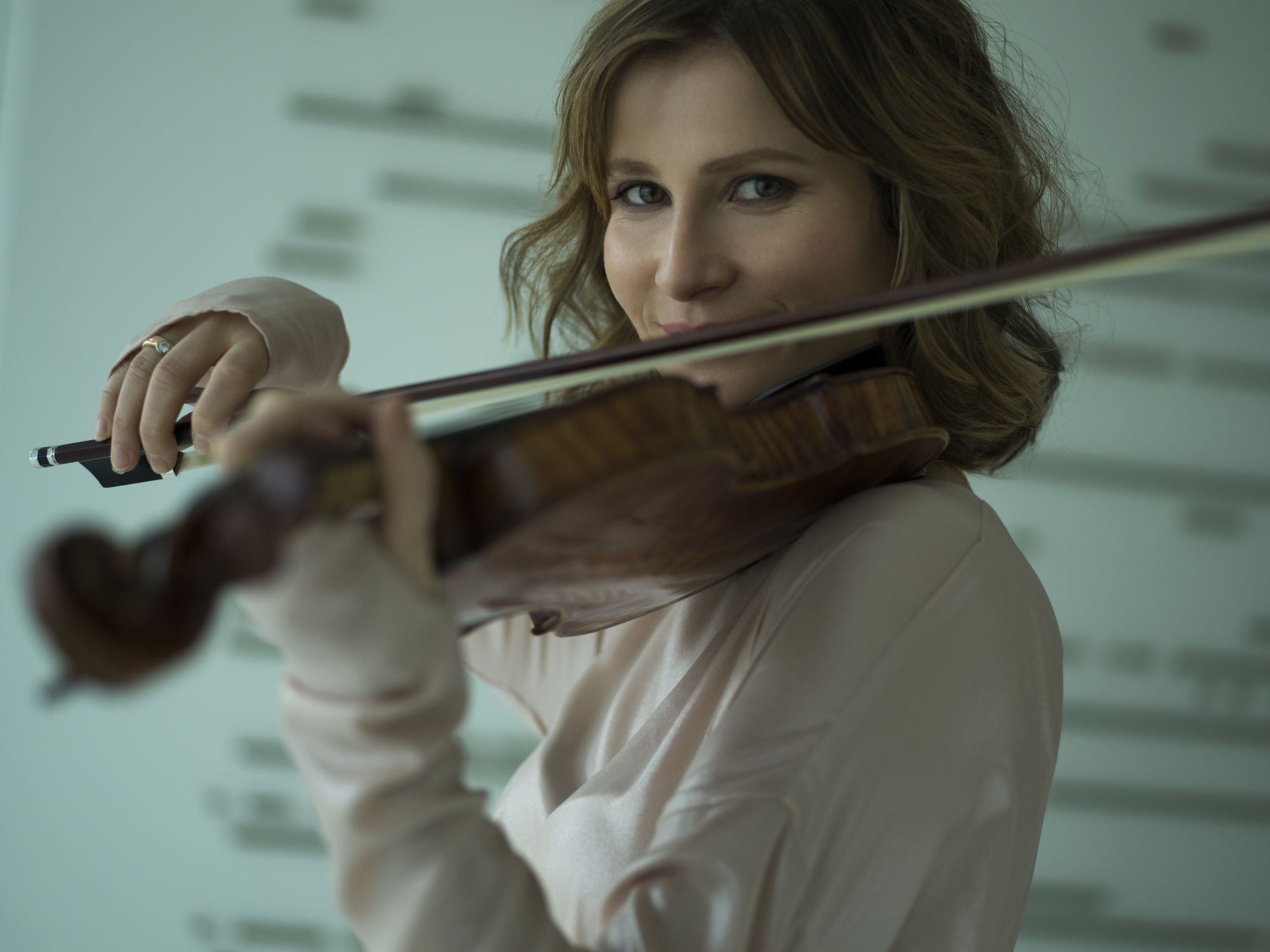Lisa Batiashvili Discusses Sibelius with WHRB Before Delivering a Fresh Boston Symphony Performance

Photo courtesy of Chris Singer.
Andris Nelsons and the Boston Symphony Orchestra have been playing to their strengths since returning to the stage, and concertgoers have been delighted. This past weekend at Symphony Hall was yet another reminder of the spellbinding qualities of live performance.
Appropriately foreshadowing the main event, the BSO’s October 16th concert opened with William Grant Still’s Threnody in Memory of Jean Sibelius. It was followed by a performance of Richard Strauss’s Symphonic Fantasy on Die Frau Ohne Schatten, demonstrating to a captivated audience Nelsons’s expertise in the music of Strauss. All those sitting in Symphony Hall, whether onstage or in the audience, seemed aware of an open secret – these opening works were simply to bide the time until the performance of the celebrated Violin Concerto of Jean Sibelius, performed by renowned Georgian violinist Lisa Batiashvili, who was returning to the United States for the first time since the pandemic began.
WHRB had the great pleasure of speaking with Batiashvili about Sibelius’s warhorse violin concerto in advance of her performance. When asked how she approaches performing such a recognizable and oft-repeated work, Batiashvili explained how thoroughly she prepares as if she’s working with the piece for the first time with blank, unmarked pages of music. Regularly, Batiashvili changes her bowing decisions and fingerings in order to provide a fresh perspective for herself as a performer, and in turn, for her audiences. She described what she sees as a paradox with performing compositions as ubiquitous as Sibelius is in the violin repertoire; sometimes this type of work can allow for greater ease in keeping the music sounding new.
Batiasvhili also spent time listening to and reflecting on the first draft of the violin concerto, which was discarded around a year before the premiere of the work as it is known and loved. She keeps a recording of the first draft on-hand; violinist Leonidas Kavakos, with whom she has worked, is the one musician who has had permission to record the other version. Laughing, she opined that there were some moments in the original that she wished Sibelius had kept. For a concerto in which cadenzas play such a critical role, Batiashvili was surprised a third cadenza, just shy of the conclusion of the piece, was cut. She drew parallels between the removed cadenza and the music of Bach, pointing out how nearly all classical composers are connected to or responding to the Baroque composer. Excluding the forgotten cadenza, WHRB asked Batiashvili if she sees connections between Sibelius’s Violin Concerto and other concerti or classical works. After a brief moment to reflect, she remarked that the violin concerto stands alone.
Distinctly aware of the role of nationalism in Sibelius’s music, Batiasvhili described how the nationality of an audience or orchestra informs a performance. Her first recording of the Sibelius Violin Concerto in 2007 was with a Finnish orchestra, a thoughtful choice reflecting the Finnish origins of the work and her own history as one of the youngest violinists to place in the Helsinki-based Sibelius Competition. Nearly a decade later in 2016, her fiery recording with the Staatskapelle Berlin showcases similarly thoughtful phrasing but an entirely different performance. Somehow, she channelled even more youthful energy while showcasing greater maturity. Looking to her return to the United States, Batiashvili found herself performing the work in yet another context – in the midst of a gradual rebirth in the wake of a prolonged global tragedy, returning to a country across the ocean where it was previously unsafe to venture.
Batiashvili described her process in retaining freshness for a performance of a warhorse, and indeed, she delivered freshness. Despite being sandwiched in between the concertmasters and the conductor’s podium, she and her violin commanded the stage as the BSO faded into the background. Moments of unpredictable phrasing were paired with comfortingly predictable melodies and showy technicalities that everyone in the concert hall was waiting for. The performance stretched time so that it felt as if time had stopped while the concerto itself was impossibly short. By the third movement, Batiashvili was off to the races, sustaining control despite a pace more frantic than her previous recordings of the work.
The performance was greeted with rousing applause—shamelessly, after the first movement—and a well-deserved standing ovation upon the radiant final note. Both by virtue of the weekend’s performances and the sheer delight of the environment of a concert hall, it is evident that the excitement of the BSO’s return has yet to fade.
Batiashvili also spoke with WHRB about the Lisa Batiashvili Foundation, which she began a few months ago. The organization’s mission is to support young musicians through assisting with the sometimes prohibitive financial costs associated with travel, masterclasses, and auditions. To learn more about the Foundation’s work or to support its mission, visit lisabatiashvili-foundation.org.
Ellie Taylor is a producer for the Classical Music Department and the host of New Releases on Wednesdays from 8-10 PM.